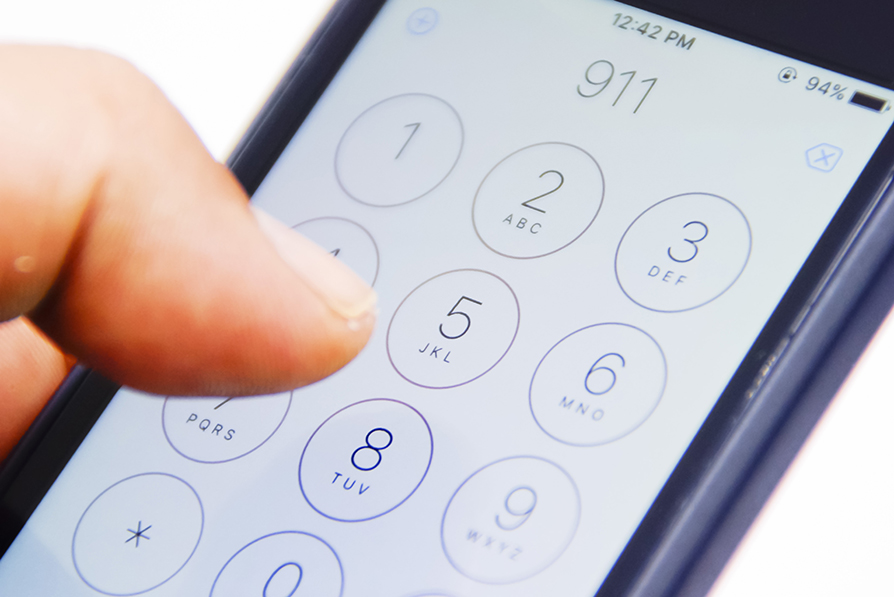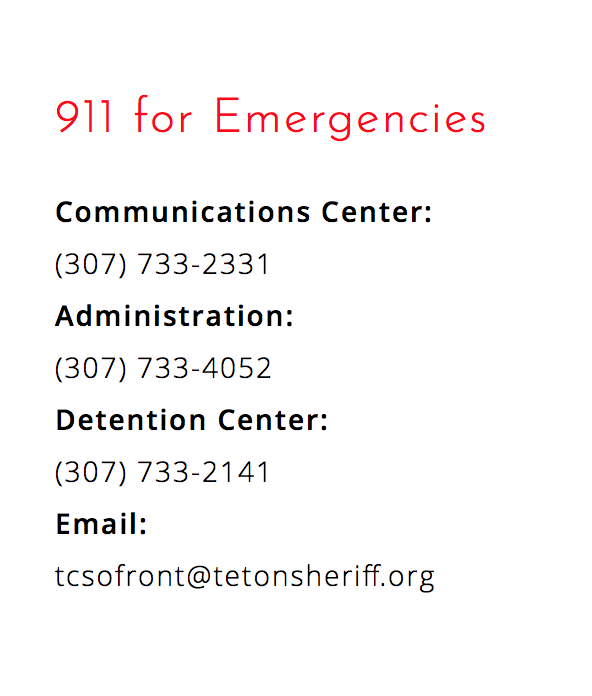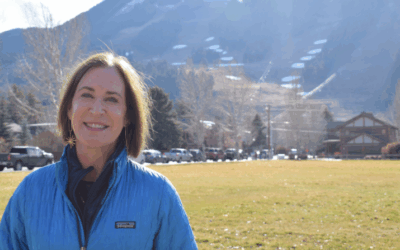When we call 911, we expect a quick connection to the nearest dispatcher. But recent reporting from the Jackson Hole News & Guide found that so-called “cell skips” are leaving some mountain town residents in a lurch. KHOL news director Kyle Mackie spoke to News & Guide reporter Emily Mieure, who covers criminal justice and emergency news, to learn more.
MACKIE: Emily, thank you so much for joining us today on KHOL.
MIEURE: Thanks for having me.
MACKIE: Tell us how you found out about this issue.
MIEURE: I saw it on Facebook, which is where I think a lot of other people saw it. The woman who had this experience with the dropped call wrote about it and put it on Misty’s List, which has a massive following. It’s kind of a local but also regional marketplace group, where also kind of, like, news gets shared to.
MACKIE: So, yes, as you mentioned, your story starts with the experience of one woman living in Alpine. Can you tell us about what happened to her?
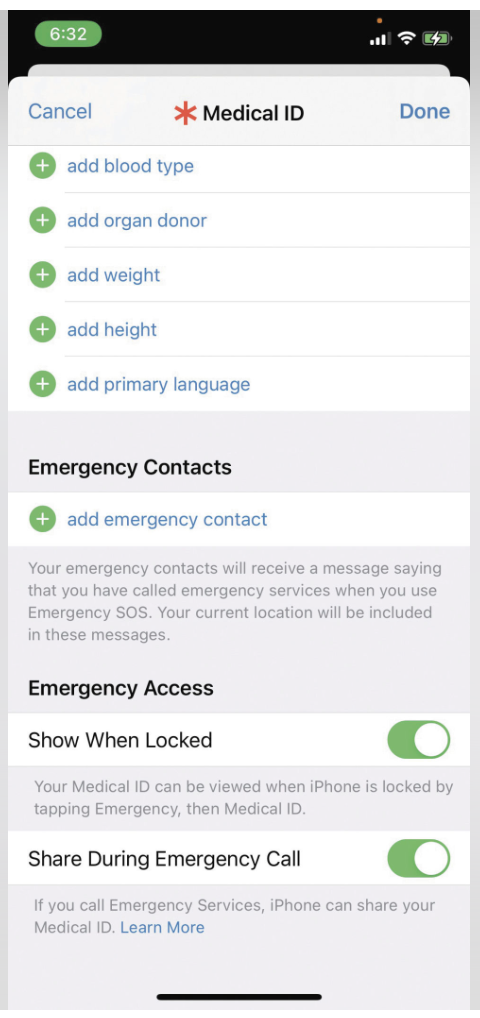
iPhone users can turn on location sharing during emergency phone calls in the phone’s native Health application. (Courtesy of Jackson Hole News & Guide)
MIEURE: Yeah, Clairey Grubbs was home and she noticed her smoke detectors going off, and she didn’t smell or see any smoke. And so, she calls—she wasn’t sure if it was an emergency at first. So, she calls a friend who’s a volunteer firefighter. And then pretty soon she sees the smoke going across her ceiling and she smells it and he’s like, “Hang up, call 911.” So, she did, and she ended up linked to a dispatcher in Fremont County, Idaho, which is not where she lives. She lives in Alpine in Lincoln County, Wyoming. And so when they tried to transfer her, she ended up with a recording that said “Your call could not be completed as dialed” and then a dial tone, which she was really shocked by because that’s not supposed to happen when you call 911.
MACKIE: Yeah. As you say, we are trained from, I don’t know, elementary school to call 911 when an emergency happens. So, that would be alarming for anyone, I imagine. So, what did you find out in your reporting is exactly happening with these calls?
MIEURE: It was so interesting in the reporting process. I actually learned a lot because this has been going on for years, I guess, in this area. And it’s something that dispatchers are dealing with on a daily basis. But because there are so many different cell towers, especially in Lincoln County, if you are trying to call 911 from, say, Alpine, a lot of times your call is going to bounce off of a tower that actually sits in Idaho. So, a lot of those 911 calls are bouncing to Idaho Falls, Idaho, and then those dispatchers routinely transfer them back over to Lincoln County. So, the dispatchers I interviewed said that’s why it’s so important for when you call 911 to state your location.
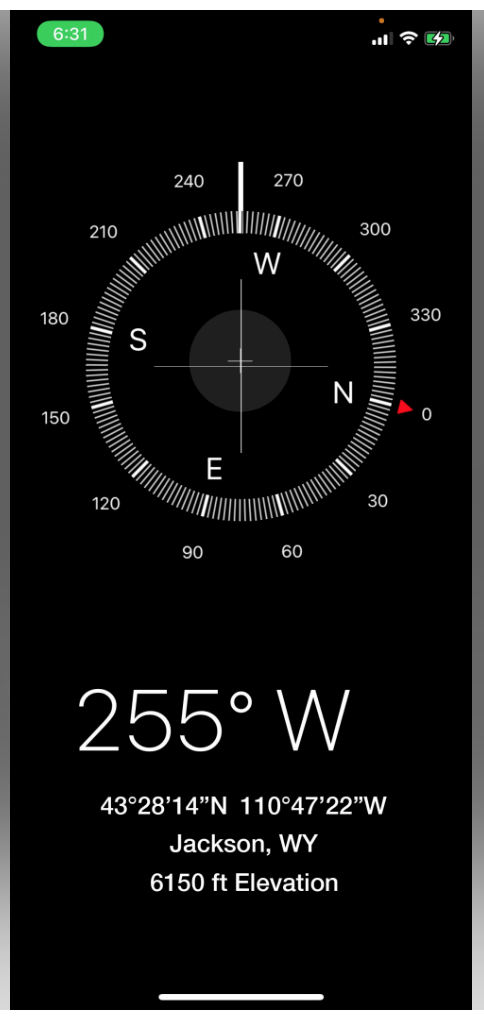
iPhone users can access their precise GPS coordinates in the phone’s native compass application. (Courtesy of Jackson Hole News & Guide)
MACKIE: Beyond that, is there any solution? What are the best practices that people, say, living in Alpine can follow to try and make sure that their 911 calls do get through?
MIEURE: The reason I had so much fun reporting this story was because it truly is news you can use, which sounds corny, but these are things that I even learned while doing the interviews. And in the story, we include some graphics that are really just screenshots of an iPhone from my phone. And there is inside of the medical ID in the health app on an iPhone, you can turn on sharing—it just says at the bottom of the medical ID app, “Share your location with an emergency responder,” and you can turn that on. And that allows dispatchers to see on their end when they’re receiving the emergency call what your location is. And then there’s also the compass app, which I didn’t have either if things turned out on my phone and now I do, but the compass app is a separate app on a smartphone and you can turn that on to know your precise location so that if you need to, you can share your actual coordinates with a dispatcher.
Other than that, some of the solutions that dispatchers have been working on over the years are with the actual cell providers and the communications companies. So, like AT&T and Verizon, etc. And some of the issues actually lie with the towers and where the sectors on the towers are pointing to. So, like the one in Alpine that a lot of people are getting, the tower sits in Idaho and all of those sectors are pointing to Bonneville County, Idaho, instead of Lincoln County, Wyoming. And so those are things that are constantly happening with dispatch centers behind the scenes and trying to get some of their calls to actually come to their centers. So, I don’t think that there’s a quick solution. The dispatch supervisors that I spoke with said that they’re hoping to have it all worked out in the next couple of years.
MACKIE: Well, that would certainly be a reassurance for folks in Alpine or people in other mountain towns along that, you know Wyoming-Idaho border. Is there anything else that you want area residents to know about this issue?
MIEURE: I think the most important thing that I didn’t think of when I interviewed the dispatchers was they really want to get out the message that folks who live around here should memorize and/or save the administration number to their local dispatch centers, which is not like what we’re taught in elementary school to call 911. But if 911 fails you, like it did Clairey in this situation, you should try and train yourself to think, ‘Oh, I have that backup number,’ so now I have Jackson Dispatch saved in my phone just under “Jackson Dispatch.” So, we included some of the numbers to the administrative lines for Afton and Kemmerer, which are in Lincoln County as well, in the story.
MACKIE: And what about landlines? You talk a little bit about landlines in the story. If people have the option of calling from a landline, is that a safer bet?
MIEURE: Yes. If you have the option to call from a landline, dispatchers say that that is the best bet because those landlines are connected to your address. And so, the dispatchers on the receiving end of the 911 call will actually see your address pop up on their screens if you’re calling from a landline. They also understand that many people don’t have landlines anymore, which I think is why they thought that, you know, this issue that Clairey had sparked a really important discussion about how to make yourself safer when having to call from a cell phone.
MACKIE: Okay, great. Well, Emily, thank you so much for your reporting and for sharing it with us today on the station.
MIEURE: Thanks for having me.

